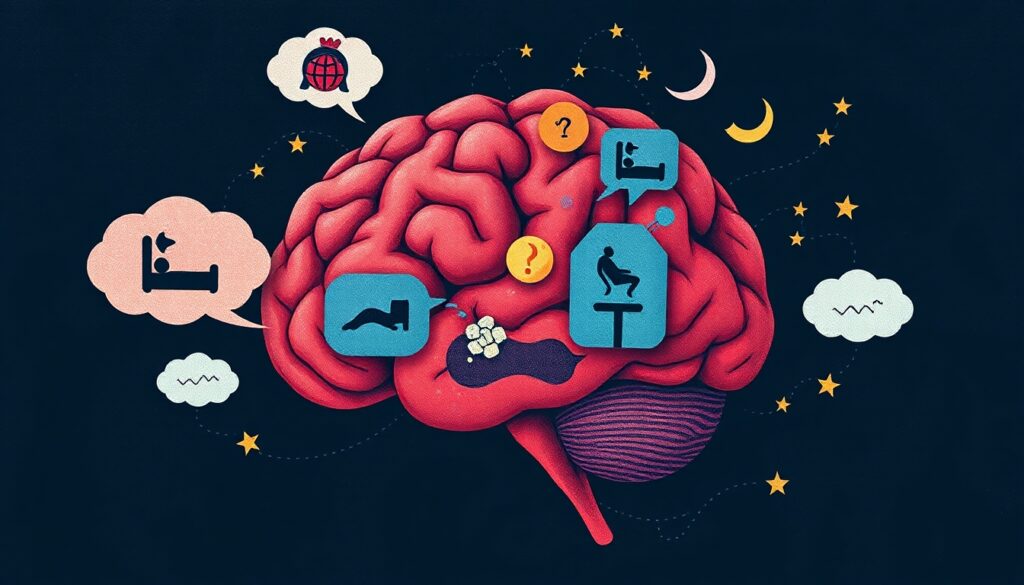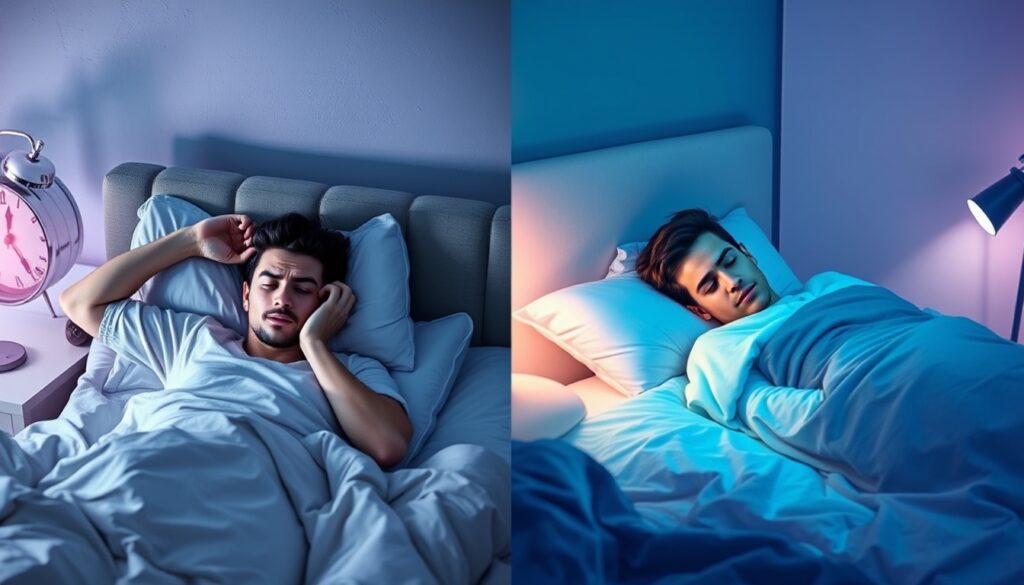Discover effective strategies to improve your sleep quality and combat common sleep disorders. Learn about insomnia, sleep apnea, and more, and unlock a healthier, happier you with these practical tips!
Craving some quality sleep? Or perhaps you’ve lost sleep over not sleeping well? No wonder—sleep needs can be as thrilling and unpredictable as a roller coaster ride! Sleep needs can be as unique as each person! Most healthy adults can stay awake for about 16 hours and typically require around eight hours of sleep each night. However, some people function well with just six hours, while others need up to ten hours to feel their best.
And here’s the bold twist: as we age, our sleep cravings don’t simply fade away! Older adults still seek those vital hours of rest, even if it becomes a challenge to secure six to eight hours of uninterrupted sleep. Quality sleep is the ultimate secret weapon for living life to the fullest at any age!
Check out our article for deep sleep.

Understanding the Impact of Stress on Sleep: Causes
The Role of Stress in Sleep Disruption
Stress is the leading cause of short-term sleep problems, according to sleep experts. It’s no surprise, then, that many people struggle with their nightly rest. Common sources of stress include pressures from school or work, family or marital issues, and the heavy burdens of serious illness or death in the family. Typically, sleep difficulties resolve once the stressful situation ends, allowing for a return to peaceful slumber. However, if short-term sleep issues like insomnia are not addressed properly from the start, they can linger long after the initial stress has disappeared, turning a temporary situation into a chronic problem.
Lifestyle Choices That Affect Sleep Quality
Moreover, various lifestyle choices can further disrupt sleep. For instance, consuming alcohol or caffeinated drinks in the afternoon or evening can keep you tossing and turning at night. Exercising too close to bedtime can also prevent your body from winding down. Maintaining an irregular schedule for mornings and nights adds to the confusion, making it harder to establish a healthy sleep pattern. Engaging in mentally demanding activities right before or after getting into bed can stimulate your mind when it should be relaxing. Another, culprit is the sedentary Lifestyle. Modern conveniences have led to more sedentary lifestyles, which can negatively impact sleep quality. Regular physical activity is vital for promoting better sleep, and a lack of movement can lead to insomnia and sleep disturbances.
The Challenges of a 24/7 Lifestyle
Additionally, a 24/7 lifestyle can wreak havoc on regular sleep patterns. In particular, the global economy operates around the clock, with industries striving to stay competitive. This relentless pace, coupled with the widespread use of nonstop automated communication systems and the increase in shift work, makes it increasingly challenging to sleep at consistent times. In this fast-paced world, finding a way to prioritize restful sleep is more important than ever.
The Impact of Technology on Sleep
The proliferation of smartphones, tablets, and computers has led to increased screen time, particularly before bed. The blue light emitted by screens can interfere with melatonin production, the hormone responsible for regulating sleep.
Sleep Disorders Uncovered: Your Guide to Understanding Them
1. Insomnia
Insomnia is when you have trouble falling asleep, staying asleep, or waking up too early. Consequently, this can make you feel really tired and grumpy during the day. It can last a short time (like a few nights) or, on the other hand, a long time (months or longer). Things like stress, anxiety, or too much screen time before bed can definitely make it worse. To help with insomnia, you might need to change some habits, talk to someone, or even take medication.
2. Sleep Apnea
Sleep apnea is a serious condition where, unexpectedly, your breathing stops and starts while you sleep. The most common type occurs when your throat muscles relax too much, thereby blocking your airway. As a result, this can make you wake up a lot during the night and feel very tired during the day. You might snore loudly or wake up gasping for air. To treat sleep apnea, some people use special machines to help them breathe better at night or may need to see a doctor for further assistance.
3. Narcolepsy
Narcolepsy is a disorder that makes you feel super sleepy during the day and can, unexpectedly, cause sudden sleep attacks. This means you might fall asleep unexpectedly, even when you’re doing something important. Additionally, people with narcolepsy can also experience muscle weakness when they feel strong emotions. Consequently, this can make school or sports challenging. Doctors can help with medications and lifestyle changes to effectively manage narcolepsy.
4. Restless Legs Syndrome (RLS)
Restless Legs Syndrome is when you feel an uncomfortable urge to move your legs, especially at night. Often, it feels like tingling or crawling sensations that make it hard to relax and sleep. While people usually feel better when they move their legs, this can, unfortunately, keep them awake. Therefore, RLS can lead to tiredness during the day. Treatment might include changes to your daily habits or taking certain medications to help you feel more comfortable.
5. Parasomnias
Parasomnias are weird behaviors that happen while you’re sleeping, such as sleepwalking, night terrors, or talking in your sleep. For example, someone might get up and walk around without even knowing it! These behaviors can scare you or your family and can, as a result, lead to confusion when you wake up. To help with parasomnias, it’s important to create a safe sleep environment and sometimes seek medical advice for better management.
6. Circadian Rhythm Disorders
Circadian rhythm disorders happen when your body clock is out of sync with the world around you. Consequently, this can make it hard to fall asleep at night and wake up in the morning. Things like working late shifts or traveling across time zones can definitely cause this problem. If you have this disorder, you might feel really sleepy during the day, which is frustrating. To fix it, you can try to keep a consistent sleep schedule and use light therapy to help reset your body clock.
7. Hypersomnia
Hypersomnia is when you feel excessively sleepy during the day, even after a full night’s sleep. This can lead to falling asleep in class or during activities, which can, understandably, be embarrassing. It can happen for various reasons, like other sleep disorders or health issues. To manage hypersomnia, you might need to see a doctor for help and, importantly, make changes to your routine.
8. Sleep-Related Movement Disorders
These disorders involve strange movements during sleep, such as kicking or twitching. A common type is called periodic limb movement disorder, where your legs move uncontrollably at night. This can, unfortunately, interrupt your sleep and leave you feeling tired. Treatment may involve lifestyle changes and, in some cases, medication to reduce movement during sleep for better rest.
9. Sleep Hygiene Disorders
Sleep hygiene disorders are caused by bad sleep habits that make it hard to get a good night’s sleep. This includes things like staying up late on your phone or not having a regular sleep schedule. As a result, poor sleep habits can lead to feeling tired and unfocused during the day. Improving sleep hygiene means creating good habits, like going to bed at the same time every night and limiting screen time before bed for better overall sleep quality.
10. Psychophysiological Insomnia
This type of insomnia is when anxiety about not being able to sleep makes the problem worse. You might start to worry a lot about getting enough sleep, which makes it even harder to relax. Consequently, this creates a cycle where the more you worry, the harder it is to sleep. Talking to a counselor or therapist and using relaxation techniques can help break this cycle and improve your sleep.

The Hidden Dangers of Insomnia: 10 Serious Health Risks
Insomnia is more than just a pesky inconvenience; it can trigger a cascade of serious health issues that affect both physical and mental well-being. When sleeplessness becomes a frequent adversary, it can lead to a range of complications. Let’s explore ten major health disorders linked to poor sleep, particularly insomnia.
1. Cardiovascular Health Risks
Chronic sleep deprivation significantly increases the risk of cardiovascular diseases, such as high blood pressure, heart disease, stroke, and arrhythmias (Your heart needs that beauty sleep!). Deep sleep allows the heart rate and blood pressure to drop, giving your heart a chance to recover. Disrupted sleep undermines this process, leading to elevated blood pressure and a heightened risk of heart-related conditions. Studies reveal that those who regularly sleep less than six hours per night are more prone to hypertension and coronary artery disease.
2. Weight Gain and Obesity
Lack of sleep is closely tied to weight gain and obesity. Insufficient rest disrupts the balance of hunger hormones—ghrelin, which boosts appetite, and leptin, which suppresses it. When you don’t get enough sleep, ghrelin levels surge while leptin levels plummet, leading to increased cravings and overeating, especially high-calorie foods. Additionally, sleep deprivation drains energy levels, reducing physical activity and slowing metabolism, both contributing to weight gain.
3. Increased Diabetes Risk
Inadequate sleep elevates the risk of developing type 2 diabetes. While you sleep, your body regulates glucose and insulin levels. Poor sleep disrupts this process, leading to insulin resistance and elevated blood sugar levels. Individuals who consistently sleep fewer than six hours each night are more likely to experience impaired glucose tolerance and, ultimately, type 2 diabetes. Moreover, lack of sleep increases cravings for sugary foods, complicating blood sugar management.
4. Deteriorating Mental Health
One of the most significant impacts of insomnia is on mental health. Anxiety, depression, and mood disorders often worsen due to chronic sleep deprivation. Restorative sleep, particularly REM sleep, is essential for emotional regulation and stress management. When deprived of sleep, individuals may experience irritability and heightened emotional responses, creating a vicious cycle where poor sleep exacerbates mental health issues and vice versa.
5. Compromised Immune Function
Sleep is vital for a robust immune system. During sleep, the body produces cytokines—proteins that help combat infections and inflammation. Insufficient sleep weakens the immune response, making individuals more susceptible to illnesses like colds and flu. Research shows that those who don’t get enough sleep are at a higher risk of falling ill and take longer to recover when they do.
6. Cognitive Decline and Impairment
Sleep is crucial for optimal brain function, including memory consolidation, information processing, and learning. Insufficient sleep negatively impacts cognitive performance, leading to difficulties with concentration, memory recall, decision-making, and creativity. Chronic sleep deprivation has been linked to long-term cognitive decline and may even increase the risk of dementia and Alzheimer’s disease by impairing the brain’s ability to clear out beta-amyloid, a protein associated with Alzheimer’s.
7. Worsening Chronic Pain
The relationship between sleep and pain is profound. Poor sleep can intensify chronic pain conditions like arthritis, fibromyalgia, and migraines. Conversely, chronic pain often hinders restful sleep, creating a detrimental cycle. Sleep deprivation heightens pain sensitivity, meaning those who are sleep-deprived may experience more intense pain than those who sleep well, further diminishing their quality of life.
8. Hormonal Disruptions
Sleep plays a critical role in regulating hormones that control various bodily functions. Growth hormone, essential for cell repair and muscle growth, is primarily released during deep sleep. Disrupted sleep hampers this release, affecting physical recovery and growth in children. Additionally, sleep deprivation can cause fluctuations in cortisol (the stress hormone), leading to heightened stress levels and poorer recovery from workouts.
9. Gastrointestinal Health Issues
Poor sleep is associated with gastrointestinal problems such as gastroesophageal reflux disease (GERD) and irritable bowel syndrome (IBS). GERD symptoms can worsen at night, as lying down allows stomach acid to flow back into the esophagus, disrupting sleep. Conversely, inadequate sleep can increase gut inflammation, exacerbating IBS symptoms. Chronic sleep disturbances can also negatively impact gut health, which plays a significant role in regulating sleep-wake cycles.
10. Signs of Premature Aging
Insufficient sleep accelerates premature aging. Chronic sleep deprivation elevates cortisol levels, which can break down collagen—the protein responsible for keeping skin firm and elastic. This leads to the formation of fine lines, wrinkles, and dark circles under the eyes. Additionally, lack of sleep hampers the body’s ability to repair skin damage from daily exposure to UV rays and pollutants, resulting in an overall decline in skin appearance and health over time.

Effective Sleep Strategies to Overcome Common Sleep Problems
Leading sleep experts have identified several effective strategies to help people tackle common sleep issues. Here’s a detailed look at their suggestions, broken down into practical steps:
1.Stick to a Regular Sleep Schedule
One of the most important aspects of good sleep hygiene is having a consistent sleep and wake routine. Try to go to bed and wake up at the same times every day, including weekends. This regularity helps regulate your body’s internal clock, making it easier to fall asleep and wake up feeling refreshed.
2. Limit Caffeine Intake for Better Sleep
Caffeine is a well-known stimulant that can make it difficult to fall asleep. To improve your sleep, it’s best to avoid caffeine—found in coffee, tea, chocolate, and some soft drinks—for at least four to six hours before bed. Additionally, think about cutting back on caffeine during the day. This will help your body wind down as bedtime approaches.
3. Avoid Smoking for Improved Sleep Quality
Smoking has many harmful effects on health, and it can significantly impact sleep. Nicotine is a stimulant that can keep you awake. If you smoke, especially try to avoid it close to bedtime. If you wake up during the night, smoking can make it harder to fall back asleep. Quitting smoking entirely can lead to better sleep quality over time. (Quitting smoking can lead to better sleep—plus, your lungs will thank you!)
4. Steer Clear of Alcohol and Heavy Meals
While some people think a drink can help them relax before bed, alcohol can actually disrupt your sleep cycle. It often leads to restless sleep, making it harder to stay asleep. Additionally, eating heavy or rich meals before bed can cause discomfort and indigestion, further hindering your ability to sleep well. Aim to finish eating at least a couple of hours before you plan to go to bed.
5. Engage in Regular Exercise for Sound Sleep
Getting regular physical activity can greatly improve your sleep quality. Exercise helps reduce stress and anxiety, making it easier to relax at night. Try to engage in at least 30 minutes of moderate exercise most days. However, avoid intense workouts close to bedtime, as they may energize you when you should be winding down.
6. Create a Quiet and Dark Sleep Environment
Your sleep setting is crucial for restful sleep. To enhance your sleep quality, reduce distractions by keeping noise to a minimum. If you live in a noisy area, consider using earplugs or a white noise machine. Additionally, make your bedroom as dark as possible. Blackout curtains can block out light, and it’s wise to turn off electronic devices that emit light. Keeping the room at a comfortable temperature—neither too hot nor too cold—also contributes to better sleep.
7. Establish a Consistent Bedtime Routine
Creating a consistent bedtime routine signals to your body that it’s time to relax and prepare for sleep. Try to go to bed at the same time each night. This can help improve your sleep quality and allow you to wake up feeling more refreshed in the morning.
8. Wake Up Naturally Without an Alarm
Whenever possible, aim to wake up without an alarm clock. This allows your body to finish its natural sleep cycles, helping you feel more rested and alert. If you need an alarm, try placing it across the room so you have to get out of bed to turn it off. This can help you resist the urge to hit the snooze button.
9. Gradually Adjust Your Bedtime for Better Rest
If you want to change your sleep schedule, consider going to bed a little earlier each night. This gradual change lets your body adapt without feeling overwhelmed. For instance, if you currently go to bed at midnight, try moving it to 11:45 PM for a few nights, then to 11:30 PM, and so on. This method ensures you get enough rest and helps you feel more alert during the day.
Conclusion: Elevate Your Sleep Quality Today & Have Sweet Dreams
By embracing these strategies into your daily life, you can enhance your sleep quality and overall well-being. So aim for better sleep and open the door to a happier, healthier you!
Quality sleep boosts your physical health, sharpens your mind, and lifts your spirits, making you ready to tackle whatever life throws your way. So, recognize the threats, follow the tips, sleep well and make your dreams come true with open eyes.
[…] Sleep Disorders: Conditions like sleep apnea or insomnia disrupt your natural sleep patterns. Sleep apnea, for example, causes intermittent breathing pauses during sleep, leading to fragmented rest and excessive daytime fatigue. […]